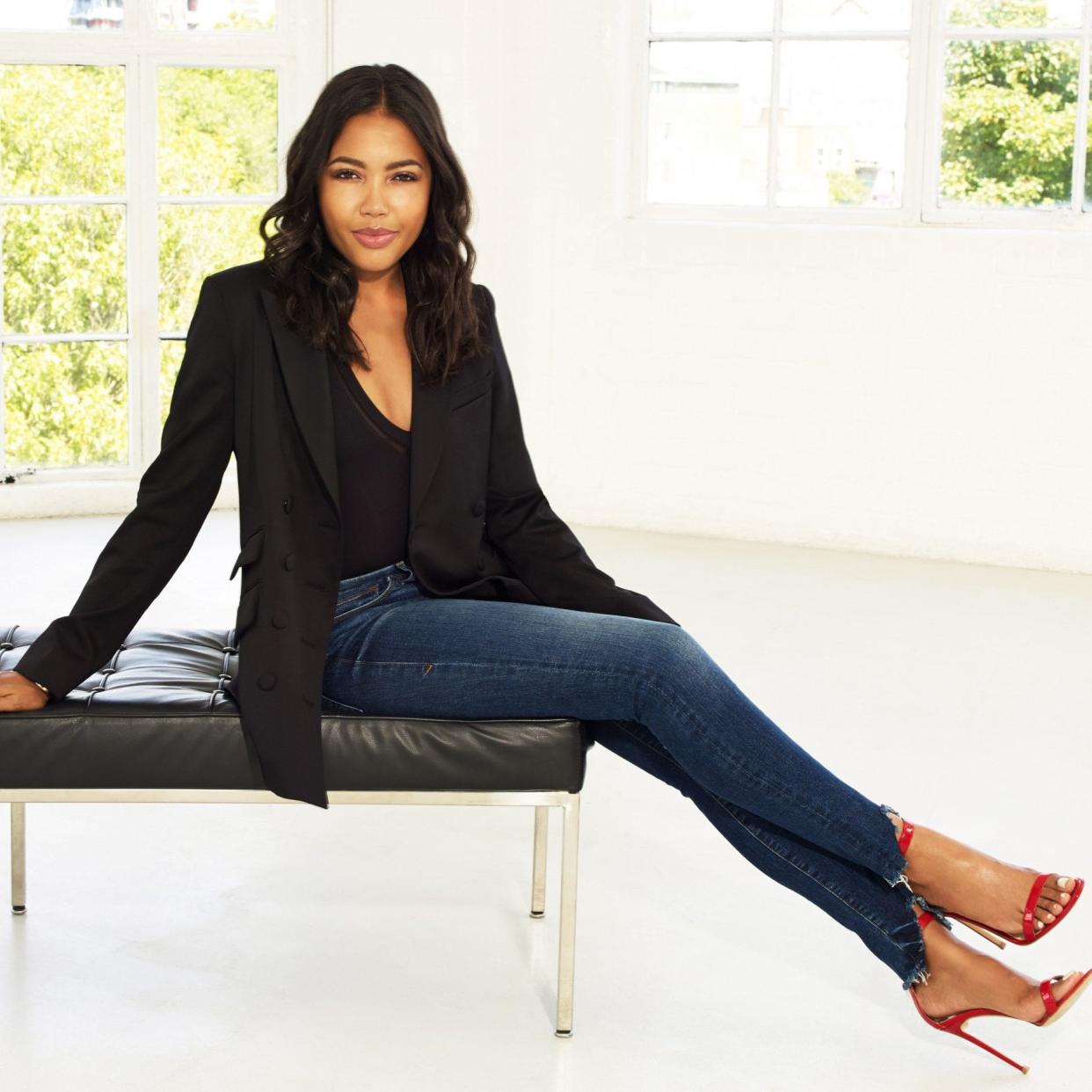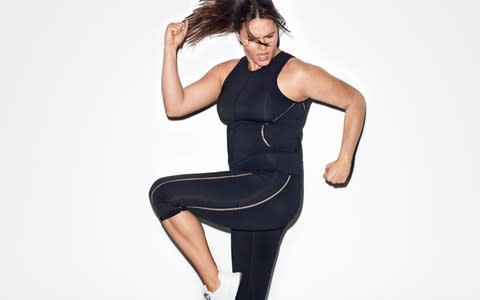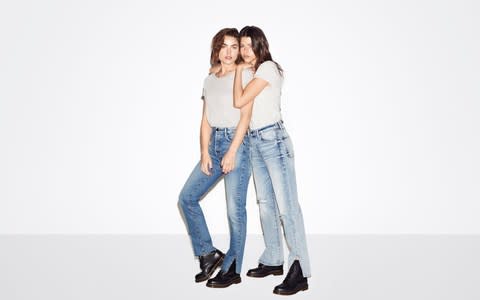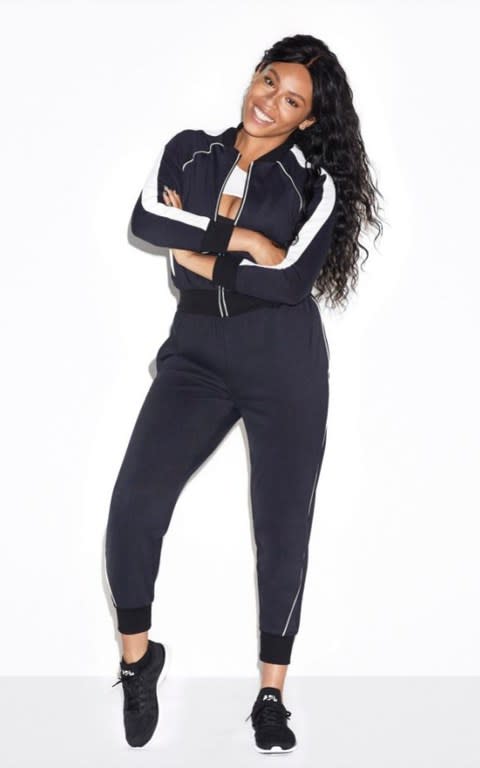Meet Emma Grede, the woman who got Selfridges and Harrods to stock size 20

On Monday morning I had a small epiphany. There I was in a dark, sweaty-air filled room, listening to power Beyoncé tracks, pummelling my fists into a punch bag. Boxing, I discovered, is an excellent start to the week. I loved it. I’ve always suspected I had some pent-up aggression, but honestly… who would have thought getting so physically livid would be such fun! I spent the whole day in an excellent mood. I was but a couple of pigtails away from skipping through the newsroom.
Anyway, I definitely do not get out of bed and into the ring for anybody. But Emma Grede is one of those women you don’t really want to say no to. She’s an infectious beacon of energy and positivity – anything she does, you think, I want in on that.
Grede is the British powerhouse behind Good American, a denim and now activewear line, which in little under two years has broken through the noise of the fashion industry’s posturing over diversity.

GA is the real deal. It’s denim collection runs from size 2 to 28, and focuses on a high waist fit in comfortable, stretch-engineered jeans. “Women dread trying on jeans,” attests Grede, “I just think it should be so much easier.” But on her watch, it’s getting there. GA denim is incredible flattering and comfortable, at Selfridges they can’t keep the biggest and smallest sizes in stock.
It now has a new boyfriend style, which, if you’ve pined over the vogue for retro-fit rigid jeans but knew that those stiff no-stretch denims weren’t getting over your hips, is a godsend. The new performance collection – which I tested out to pound the punch bag – is as impressive. The range features hi-spec tech material, four-way stretch, quick dry wicking, compression, UV protection, but the fit is revolutionary. The long-haul-flight-comfortable leggings run right up to the waist. Forget yanking your leggings up back over your butt every few paces, these do not budge. There are matching sleek-looking tops all in strong black, which, crucially, do not appear sheer at any point. It’s great.
Grede, 35, cut her teeth working in fashion production, ostensibly finding money for designers so they could put on shows and events. She’d pair designers with brands and retailers who could inject cash while receiving reflected cool and relevance. At 24, she set up her own talent agency, which saw her move to LA to engineer partnerships between celebrities and brands. Earlier this year, she sold her business of nine years to Rogers & Cowan.

GA is the fruit of her experience and belief that fashion needs to wake up to its audience. She co-founded the brand with Khloé Kardashian, cleverly striking straight into her incredible reach of 77 million Instagram followers. It’s a sharp move. And the proof is in the profits.
On its first day of trading, GA took $1 million. “We don’t do that much every day,” laughs Grede, “but we have a sizeable business for one that’s less than two years old. We’re profitable, [unlike] many start-ups.”
Grede had thought about launching an inclusive fashion brand for a while. “We wanted to fundamentally change the way women think about their bodies. We spend a lot of time obsessing about clothes and size.
“When I had my daughter, I didn’t want that to be the way she lives her life. You have to be responsible in the material you are putting about. You only have to look around to see that not all women are a size 4.”
50 flattering bikinis and one-pieces to buy now for your summer holiday
Being a direct-to-market brand is, if you can make it work, the shrewd way to get ahead in fashion now. Having a hotline via Instagram to your customers is a gift if, as Grede and Kardashian do, you listen to what they want and deliver it.
“I spend an hour every week on the bad comments,” says Grede. Equally she’s capitalised on the value of influencers who fit in with the brand’s ethos – the “Good Squad” are a carefully curated group of women who as Grede puts it are “women of substance. We don’t just choose who looks cute and looks different, the women who represent us have jobs and opinions. GA gives you confidence”.
The ethos is simple. Everything available for everyone. Whether you’re a size 6 or 26, you can shop the same collection. On the website each piece is modelled by three different size women – so you can get a much closer approximation to what you will actually look like in it.
The fashion editors' guide to dressing for work in the heatwave
Equally, GA insists that its wholesale partners take the entire size range. “We have retailers that come to us with seven figure orders and say, ‘We’ll take size 2 to 16’. We tell them where to go. We make everyone take all of the sizes.” Retailers after the line but without the larger sizes have told her that “they don’t have that customer”. Grede rolls her eyes: “They do, they’re just buying shoes and handbags. There is a backwards mentality that they don’t believe that customer exists. But there’s the other side of it where quite honestly I don’t think all fashion retailers want to embrace that particular customer.”
Happily, there are those willing to invite their accessories shoppers upstairs: Selfridges have stocked GA since its launch, and this month launched in Harrods. In both, GA is the only brand running the gauntlet of extended sizing. But snobbery aside, this blind spot is missing a financial beat. “People will catch up,” says Grede, pointing out that it’s a highly lucrative sweet spot. “We’ve built up a great case for it.”

This has clearly not gone unnoticed. Madewell and J. Crew recently announced moves into extended sizing, although primarily focused online. Forbes this week reported that the US women’s non-standard (plus size as well as extra small) size market is worth $21 billion, which is half of its projected potential given the simple fact that an average US woman wears a size 16-18 (UK average is size 16). It’s a largely up-tapped gold mine.
Grede’s story is a testament to hard work and initiative. East London born and raised (she now lives with her husband in Beverly Hills), her mother told her early on: “You’re a woman, and you’re a black woman. You’re going to have to work super-hard.”
Grede says straightforwardly: “I was unashamedly ambitious and focused. I was a poor kid and I wanted to make money. You need to be unwavering. I’m very goal-oriented, I had a 30 (year-old) plan and I have a 35 one.”
Yet equally she hasn’t let it take over. “I’d love to be able to say my business is everything to me, but it’s not. I have two living breathing humans and they need bath time and a story. If you want a meeting at 6pm, that’s not going to happen. I have to go home and read Llama Llama Red Pyjama.”